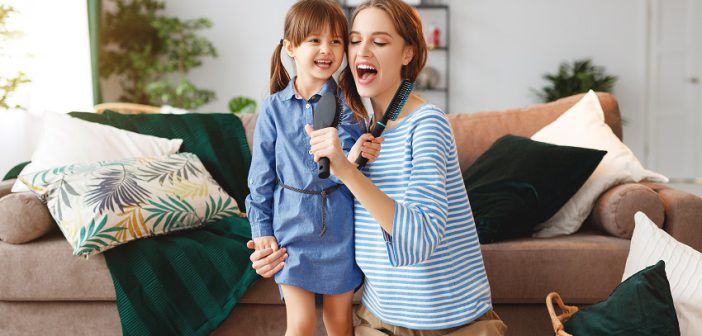By HearUSA HCP, Natalie Calderon, Au.D., F-AAA & Linda Calderon, BSN, MS, CNM
May is a big month for hearing health awareness. In Canada, the organization Speech-Language & Audiology Canada promotes Speech & Hearing Month, encouraging people to “Speak well. Hear well. Live well.” In the U.S., it’s Better Hearing and Speech Month, an initiative of the American Speech-Language-Hearing Association (ASHA), which represents audiologists, speech-language pathologists, researchers, students, and more. Better Hearing and Speech Month was started by the ASHA to increase awareness about communication disorders and hearing health. Its 2023 theme is “Building a Strong Foundation,” which is a particularly laudable message because it’s becoming increasingly clear that hearing health is inseparable from overall health.
This month, we also observe Mother’s Day, established in 1907, and an international celebration of motherhood. And while hearing health remains a year-round issue for women and men, mothers and fathers, and daughters and sons worldwide, the occasion of Mother’s Day during Speech & Hearing Month and Better Hearing and Speech Month makes this May the perfect opportunity to also raise awareness of better hearing as the basis for bonds between mothers and their children.
Such awareness is relatively new, unfortunately. As recently as 1993, only 3 percent of newborns in the United States were even screened for hearing health. Fast forward to 2019, and that figure quickly reached 98 percent, spurred by state laws and evidence that detecting hearing loss early could lead to positive outcomes, including better language abilities, intelligibility, and social-emotional development.
Still, according to the CDC, about 5 in 1,000 children aged 3 to 17 have hearing problems, a number that grows dramatically in later years. All told, about 15 percent of Americans aged 18 and older have trouble hearing. That’s 150 in 1,000 adults, including millions of mothers.
Risks of Untreated Hearing Loss
Generally speaking, untreated hearing loss can have serious ramifications. Hearing loss is not just about a lack of volume in what one hears, it’s also about an inability to clearly perceive certain auditory input. Some people have trouble hearing consonant sounds, for instance, leading them to misunderstand speech. Others struggle with high frequencies, so they have a hard time making out children’s voices. And many strain to pick up conversations in noisy places, like restaurants or parties.
All of which leads many who experience hearing loss to avoid situations where communication is a problem. Studies have shown a correlation between hearing loss and psychological distress, which can cause social isolation. Social isolation, in turn, has been shown to impact well-being.
When it comes to well-being — theirs and their children’s — the hearing health of all mothers is a strong foundation we all should care about.
Hearing Health and Healthy Motherhood
Even though we’ve come far in recognizing the importance of detecting hearing loss in babies, there is reason to be concerned that mothers themselves struggle with challenges linked to hearing loss and related communication problems. Recent studies have found that women with hearing loss are more likely to suffer pregnancy-related complications. They’re also far more likely to give birth to premature or underweight babies than women without hearing loss.
Researchers continue to explore the specific reasons hearing loss adversely impacts new mothers. But it’s understood that hearing issues limit people’s ability to benefit from healthcare messaging and communication in general and that healthcare providers aren’t always trained to communicate effectively with patients experiencing hearing loss. This is a situation groups like the World Health Organization are trying to address by encouraging hearing healthcare to be more integrated with primary healthcare.
The results of poor communication between mother and doctor can include frustration, misunderstanding, and suboptimal healthcare delivery. In general, mothers with hearing loss are less satisfied with their prenatal care and more likely to make fewer visits to their doctor.
Hearing care is critical to raising the healthy prospects of mothers and children, both at birth and throughout their lives.
Better Hearing Leads to Better Connections
The effect of hearing loss on mothers’ healthcare engagement reflects the communication challenges faced by many who experience hearing loss, whether they’re new mothers or grandmothers. Some find themselves minimizing trips to the doctor, while others withdrawing from social functions. Both have a negative effect on overall health.
Which is why initiatives like Better Hearing and Speech Month are so important. In the U.S. alone, as many as 48 million people live with hearing loss in one or both ears. Worldwide, the WHO estimates that by 2050, nearly one in four people will experience hearing loss, and about 700 million will need access to hearing care.
For many, hearing aids are part of that care. The National Institutes of Health says nearly 29 million Americas could benefit by wearing hearing aids, but it’s important they understand early on the link between hearing health and overall health.
And it’s important that people actually take control of their hearing health. They should ask questions of their doctors, visit a hearing care center to get their hearing checked, and when appropriate, get fitted for hearing aids. On average, it takes people seven years from diagnosis to hearing aid adoption. For many, that’s too long.
As providers (Audiologist and Certified Nurse Midwives) we personally create space for our Patients to self-advocate. We encourage questions and open communication. This demonstrates that the Patient is engaged and allows an opportunity to clear up any miscommunications/misunderstandings. Prior to the Patient leaving the office, key points of the current appointment and next steps are reviewed with the Provider and then again with assist staff. Patients are also encouraged to call or email with any questions and/or bring a support person to the appointment to assist as well.
In addition to its own network of hearing care professionals (HCPs) comprised of audiologists and licensed hearing aid specialists, HearUSA works with primary care providers. In some cases, when doctors suspect hearing loss, patients can see an HCP in the same or a nearby office, expediting their access to professional hearing care and, if appropriate, to the hearing aids that will boost their ability to communicate. It’s all part of HearUSA’s effort to change 1 million lives over the next five years through outstanding hearing care.
Better Hearing and Speech Month and Speech and Hearing Month remind us that everyone should take stock of their hearing health. It’s the basis of strong relationships, quality of life, and overall connectedness. Mother’s Day reminds us that one of the most important connections is between mother and child. Happy Mother’s Day, everyone. And here’s to happy hearing health, too.





For example, some individuals have difficulty hearing consonant sounds, which causes them to misinterpret what is being spoken to them. Others have difficulty with high frequencies, which makes it difficult for them to understand what youngsters are saying. And many people have to strain their ears to understand what others are saying when they are in a loud environment, such as a restaurant or a party.